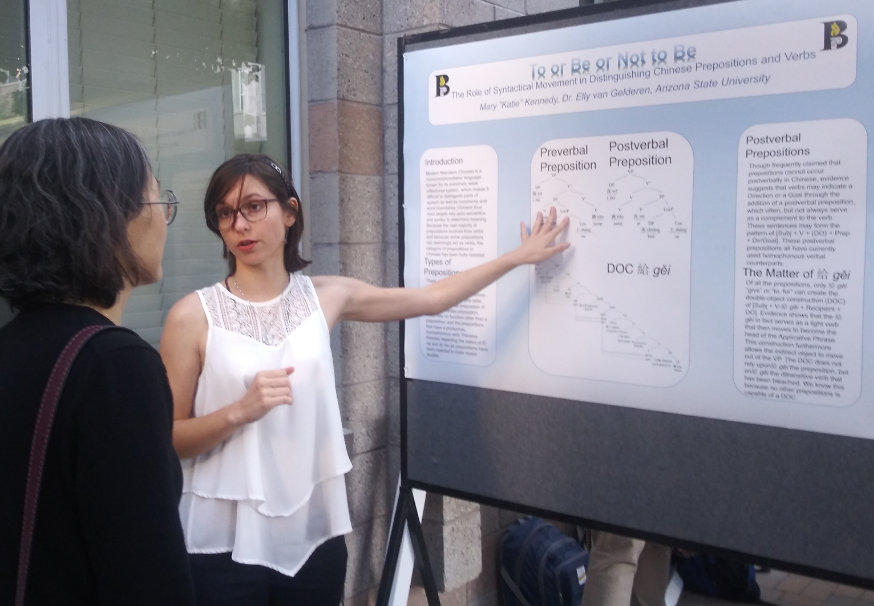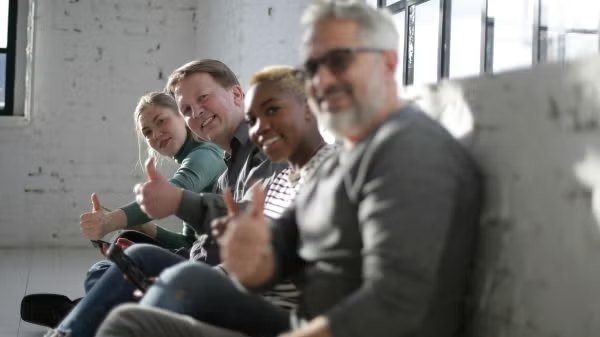‘Winning the game’: ASU language grad confronts challenges with creativity

Katie Kennedy found a unique way of working through challenges: "In video games, the game only gets harder when you defeat each level," she said. "So if my life was getting harder, it was because I was winning the game so far, leveling up and gaining new skills and strengths with each success."
Editor’s note: This is part of a series of profiles for spring 2019 commencement.
Mary “Katie” Kennedy is a model of undergraduate achievement. The Arizona State University student is finishing two Bachelor of Arts degrees this spring, in English (linguistics) and Asian languages (Chinese), and will begin a master’s degree program in linguistics and applied linguistics at ASU this fall.
Kennedy’s career prospects are good since, according to LinkedIn research, employers are increasingly seeking workers like her. Companies want employees who demonstrate intellectual flexibility and the ability to think creatively. These are precisely the skills most often taught and cultivated in the humanities.
To illustrate: Kennedy has succeeded in applying research and knowledge learned in one concentration to another. She completed an incredibly specialized Barrett, The Honors College thesis on Chinese linguistics and presented her findings, “To or Be or Not to Be: The Role of Syntactical Movement in Distinguishing Chinese Prepositions and Verbs,” in a poster session on April 19.
Kennedy is quick to attribute her success to mentorship by several people: foremost, her mother. Another transformational adviser was Regents’ Professor of English in linguistics and applied linguistics Elly van Gelderen.
The feeling is mutual; van Gelderen said that Kennedy is “an amazing undergraduate” and that her honors thesis offered an excellent analysis of its subject, helping “bring deeper insight to the faculty of language.
“Katie combines an enthusiasm for the Chinese language and the complexities of its many function words with a genuine understanding of how to approach (Chinese) word order in a formal way,” van Gelderen said.
We chatted with Kennedy to find out more about her interests, her career plans, and her unique take on facing challenges (hint: it involves video games).

Katie Kennedy explains her undergraduate honors thesis to a poster session visitor in April. Photo by Elly van Gelderen
Question: What was your “aha” moment, when you realized you wanted to study in your field?
Answer: When I first started touring colleges, I was terrified because I didn't have a clue what to study because I had no idea what I wanted to do after graduation. It was my mom who then asked me one of the most important questions I've ever gotten: What do I like? Not what do I want to do, but what do I like. While the question "What do you want to do as a job" drew a big fat blank, answering "What do I like" was easier than breathing: I loved my English classes, particularly our sentence diagramming unit; I loved my Chinese classes, particularly seeing how Chinese and English were similar and how they were different. And Mom then provided me my aha moment. She told me there was actually a field of study for those interests: linguistics. If I hadn't had this conversation, I would have never known that I could dedicate my studies to understanding how languages were built, how sentences were constructed and why languages shared some features but differed in others. Without my mom and without that conversation, I wouldn't be here, about to graduate in linguistics and Chinese.
Q: What’s something you learned while at ASU — in the classroom or otherwise — that surprised you, that changed your perspective?
A: At some point in each semester of college, I've found myself thinking, "This is the hardest semester I've ever had." Whether it was classes, jobs, applications, responsibilities or usually a combination of all four, there always came a point where I had the realization that I'd never had more challenges than I did at that point. And it wasn't until sometime in my junior year that the bi-annual realization was followed by an epiphany: My life was like those video games my brother loved to play. In video games, the game only gets harder when you defeat each level, so if my life was getting harder, it was because I was winning the game so far, leveling up and gaining new skills and strengths with each success. There are still times when I feel that things had never been harder and times when I doubt that I'll be able to finish what I started, but I've had these fears before, and I am who I am now because I was stronger than I ever gave myself credit for.
Q: Why did you choose ASU?
A: Barrett was a big draw for me. When I was first deciding on universities, the idea of attending a school of 80,000 students was incredibly intimidating; but with Barrett added to the mix, the size of ASU became a benefit. Barrett allowed me to have all the benefits, advantages and adventures of a big college while providing me a smaller, more close-knit college I could come back to at the end of the day. Because of the sheer size of ASU, I've found such a huge variety of opportunities, friends and faculty, but I've also had the cozy comfort of Barrett serving as my home base that I can come back to when a campus of thousands of students becomes a bit overwhelming.
Q: Which professor taught you the most important lesson while at ASU?
A: Elly van Gelderen has been one of the most influential teachers I've ever had. Her assignments have encouraged an independence and initiative beyond the classroom; in my first class with her, I had to research the typology of Welsh and teach myself the syntactic structure of this language I knew nothing about. I practically had a conspiracy-board built trying to compile the syntax from about 13 different sources. Her encouragement, enthusiasm and advice always helped spur me on when I got stuck. She taught me that challenges are opportunities, not problems, and that when you truly love a subject, difficulties aren't something to be dreaded because they provide new perspectives and insights. I loved syntax before my classes with Elly, but she helped me grow that love into a passion and has been an invaluable mentor to me throughout my linguistic course.
Q: What’s the best piece of advice you’d give to those still in school?
A: Be kind to yourself and don't be afraid of changing. You'll face a lot of challenges in school, both academic and beyond, and the last thing you need, but likely the first thing you'll do, is become your own worst enemy. You've accomplished so much already to get where you are, and there will be a point in time when you hit a wall you just can't seem to scale. At that point, don't be afraid to change course even just a little; plans change, and that's not always a bad thing. Sometimes, it's worse trying to ram yourself through a brick wall because you said you'd take this path; sometimes, it's better to find a new way, even if it means creating an entirely new path yourself.
Q: What was your favorite spot on campus, whether for studying, meeting friends or just thinking about life?
A: On a nice day, the garden to the side of the Virginia G. Piper Writers' House is the best place to sit down and read a good book, especially in spring when the flowers start to bloom.
Q: What are your plans after graduation?
A: After graduation, I will be returning to ASU in the fall to continue my studies with an MA in linguistics. My Barrett thesis used linguistics and syntax to distinguish and identify the matter of prepositions in Chinese, and I look forward to continuing my studies in linguistics and studying the syntax of Chinese.
Q: If someone gave you $40 million to solve one problem on our planet, what would you tackle?
A: I feel climate change is one of the greatest problems our generation and future generation is facing. If I had $40 million, I would put it towards research into renewable energy sources; if the cost can be lowered and the efficiency raised, I think we will better be able to implement renewable energies throughout the country.
More Science and technology
Statewide initiative to speed transfer of ASU lab research to marketplace
A new initiative will help speed the time it takes for groundbreaking biomedical research at Arizona’s three public universities…

ASU research seeks solutions to challenges faced by middle-aged adults
Adults in midlife comprise a large percentage of the country’s population — 24 percent of Arizonans are between 45 and 65 years…

ASU research helps prevent substance abuse, mental health problems and more
Smoking rates among teenagers today are much lower than they were a generation ago, decreasing from 36% in the late 1990s to…

